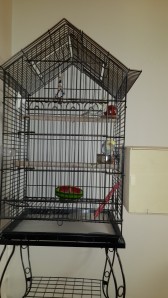Just yesterday, I got a 5-week-old pineapple conure from a local breeder. Before I brought her home, the breeder told me to give her a syringe of formula around 8pm. When 8pm arrived, I prepared her formula, (the temp was about 38-39° celcius), put in in a 10mL syringe, and introduced the syringe to her. But she showed absolutely zero signs of wanting to eat or being hungry. She refused to open her beak and did not look enticed by the formula at all. I did not expect this as I've hand fed a baby conure before, and he would always perk up right away at the sight of the syringe. Since yesterday, I've been having to "force" feed her. I gently pry her beak open and insert the syringe, squeezing about half a mL into her mouth at a time. I give her frequent breaks in between to allow her to swallow. But she does end up spitting up a lot of it. The overall process takes about 20 minutes each time. I'm not sure what to do. I'm a minor and I've been seriously contemplating calling the vet for advice but my mom thinks I'm being ridiculous and tells me to continue feeding her the way I've been feeding her, but it just doesn't feel right. I've already contacted the breeder and asked if she's ever had a difficult time eating but he said no. I have no idea what could be wrong as her behaviour isn't indicating anything either. She acts pretty normal. She's still very young so obviously she sleeps a lot but when she's not sleeping, she's usually preening herself or playfully nibbling on our fingers/jewelry/clothes. Please help me.
Any tips and advice would be greatly appreciated.
Any tips and advice would be greatly appreciated.
Last edited by a moderator:




